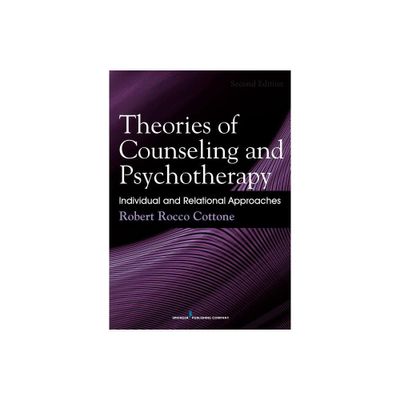Home
Psychotherapy: Approaches and Theories
Loading Inventory...
Barnes and Noble
Psychotherapy: Approaches and Theories
Current price: $19.95


Barnes and Noble
Psychotherapy: Approaches and Theories
Current price: $19.95
Loading Inventory...
Size: OS
*Product Information may vary - to confirm product availability, pricing, and additional information please contact Barnes and Noble
Best selling author David Malocco (
A Brief History of Psychology - Important Timelines; Psychotherapy - The Top 50 Theories and Theorists
; and the Amazon best seller
Forensic Science: Crime Scene Analysis
) has produced an excellent accompaniment for any psychology or psychotherapist student, practitioner or indeed anyone interested in Psychotherapy or Counselling.
The book provides a good basic introduction to psychotherapy approaches and psychotherapy theories. There are reputedly over four hundred therapies in existence but, of course, not all are utilised. The author divides the most important of these therapies into three core approaches: Psychoanalysis and the Psychodynamic Approaches; Behavioural and Cognitive Approaches and Humanistic Existentialist Approaches.
Each Approach section then covers the main therapies within that approach. The Psychodynamic Approach covers Psychoanalysis, Analytical Psychotherapy, Adlerian Psychotherapy, Object Relations Therapy and Self Psychology. There are useful biographies on Sigmund Freud, Carl Jung, Alfred Adler, Melanie Klein, D.W. Winnicott, Margaret Mahler and Heinz Kohut.
The Behavioural Cognitive Approach deals with Behaviourism, Cognitive Therapy, ACT, Dialectic Therapy, Cognitive Analytical Therapy, Mindfulness Based Therapies like Stress Reduction (MBSR) and Cognitive Therapy (MBCT), and Social Learning Therapy. Brief biographies are provided on John Watson, B.F. Skinner, Hans Eysenck, Albert Ellis, Donald Meichenbaum, Steven Hayes, Marsha Linehan, Anthony Ryle, Jon Kabat-Zinn, William Glasser and Albert Bandura.
In the third Humanistic Existential core approach, the author examines Person Centred Therapy, Gestalt Therapy, Existential Therapy, Transactional Analysis, Human Givens Therapy, Psychosynthesis, Solution Focussed Brief Therapy, and Transpersonal Therapy. Biographies on Carl Rogers, Fritz Perls, Rollo May, James Bugental, R.D. Laing, Irwin Yalom, Eric Berne, Roberto Assagioli and Insoo Kim Berg complete this section.
The author then includes a fourth part to the book under the heading Other Therapies which discusses Art, Music and Drama Therapies, EDMR, Family-Systemic Therapy, Group Therapy, Interpersonal Therapy, Play Therapy, Psychosexual Therapy and finally Integrative Therapy.
The book is a first in explaining the differences between approaches, therapies within these approaches and theories associated with each. It is an ideal reference for practitioners, a valuable textbook for students and an indispensable guide for anyone considering therapy but who is unsure which type of therapy would suit them best.
The book is a perfect addition to the Student Guides Simplified range.
A Brief History of Psychology - Important Timelines; Psychotherapy - The Top 50 Theories and Theorists
; and the Amazon best seller
Forensic Science: Crime Scene Analysis
) has produced an excellent accompaniment for any psychology or psychotherapist student, practitioner or indeed anyone interested in Psychotherapy or Counselling.
The book provides a good basic introduction to psychotherapy approaches and psychotherapy theories. There are reputedly over four hundred therapies in existence but, of course, not all are utilised. The author divides the most important of these therapies into three core approaches: Psychoanalysis and the Psychodynamic Approaches; Behavioural and Cognitive Approaches and Humanistic Existentialist Approaches.
Each Approach section then covers the main therapies within that approach. The Psychodynamic Approach covers Psychoanalysis, Analytical Psychotherapy, Adlerian Psychotherapy, Object Relations Therapy and Self Psychology. There are useful biographies on Sigmund Freud, Carl Jung, Alfred Adler, Melanie Klein, D.W. Winnicott, Margaret Mahler and Heinz Kohut.
The Behavioural Cognitive Approach deals with Behaviourism, Cognitive Therapy, ACT, Dialectic Therapy, Cognitive Analytical Therapy, Mindfulness Based Therapies like Stress Reduction (MBSR) and Cognitive Therapy (MBCT), and Social Learning Therapy. Brief biographies are provided on John Watson, B.F. Skinner, Hans Eysenck, Albert Ellis, Donald Meichenbaum, Steven Hayes, Marsha Linehan, Anthony Ryle, Jon Kabat-Zinn, William Glasser and Albert Bandura.
In the third Humanistic Existential core approach, the author examines Person Centred Therapy, Gestalt Therapy, Existential Therapy, Transactional Analysis, Human Givens Therapy, Psychosynthesis, Solution Focussed Brief Therapy, and Transpersonal Therapy. Biographies on Carl Rogers, Fritz Perls, Rollo May, James Bugental, R.D. Laing, Irwin Yalom, Eric Berne, Roberto Assagioli and Insoo Kim Berg complete this section.
The author then includes a fourth part to the book under the heading Other Therapies which discusses Art, Music and Drama Therapies, EDMR, Family-Systemic Therapy, Group Therapy, Interpersonal Therapy, Play Therapy, Psychosexual Therapy and finally Integrative Therapy.
The book is a first in explaining the differences between approaches, therapies within these approaches and theories associated with each. It is an ideal reference for practitioners, a valuable textbook for students and an indispensable guide for anyone considering therapy but who is unsure which type of therapy would suit them best.
The book is a perfect addition to the Student Guides Simplified range.


















